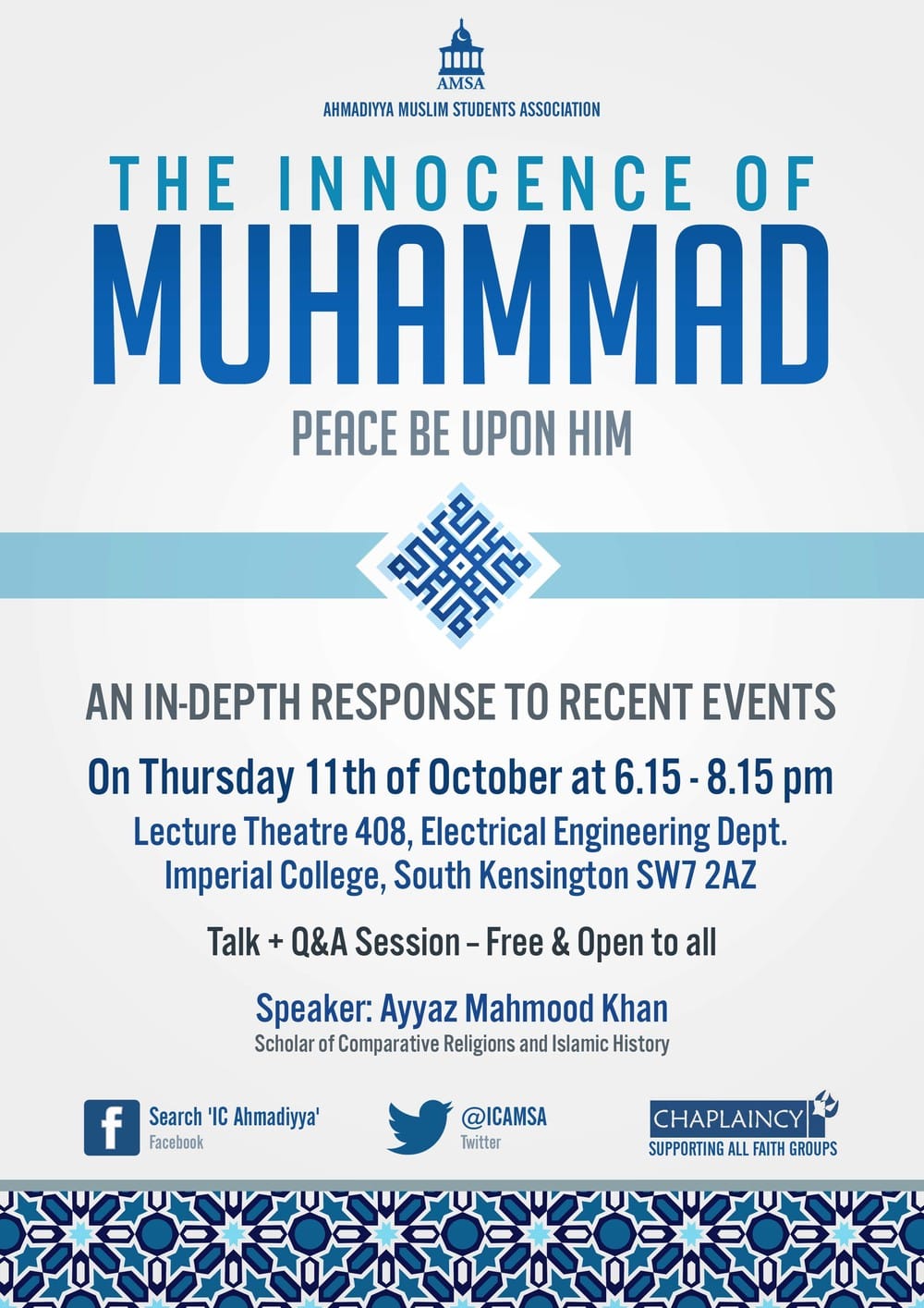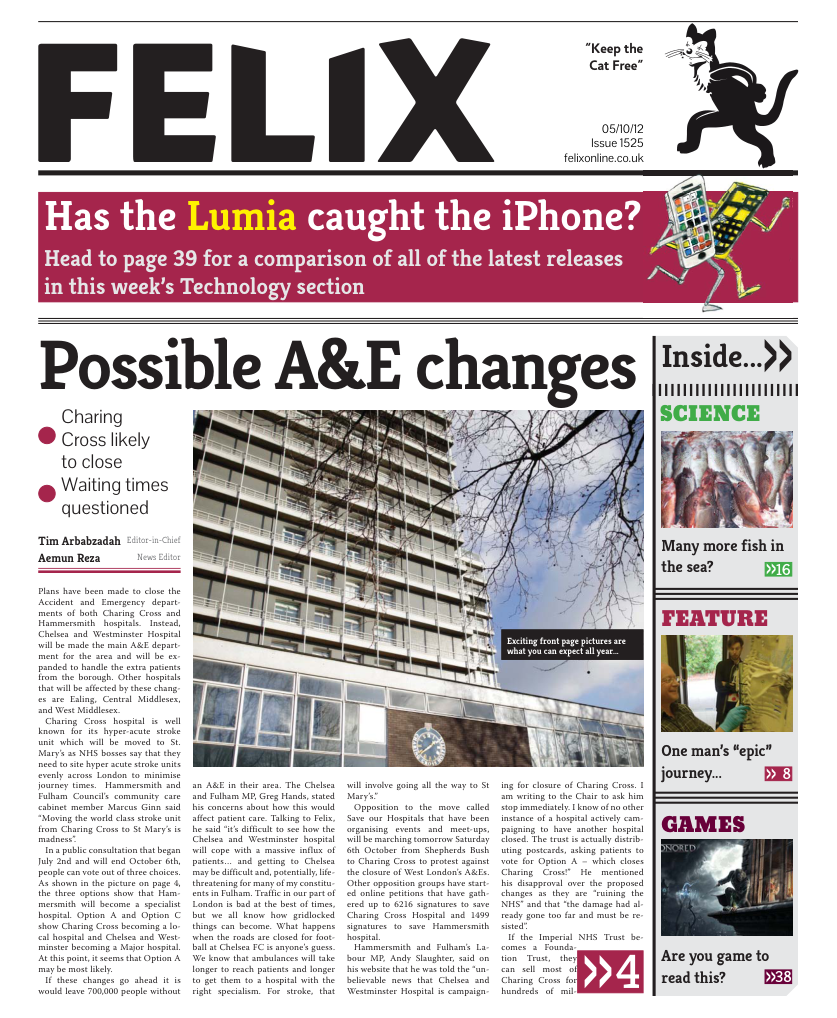Repel evil with what is best
Umar Nasser talks about the controversy over "that" film over summer

Make no mistake: “The Innocence of Muslims” is a vile film, and an insult to the Founder of Islam and Muslims the world over. Yet the response to it across the Muslim world has done far more to tarnish the name of Islam than any short film ever could.
It is, for the unacquainted, the amateur film which slandered the Founder of Islam in just about as many ways that a 13 minute movie can slander anyone, and the spark which lit the timber of so-called ‘Muslim Rage’ around the world. Global protests ensued, aimed primarily at US embassies, with much loss of life to both foreign and national citizens. In Pakistan for example, whose government announced a National Holiday to protest, well over 20 citizens have been killed – most of whom were policemen trying to contain the rioting. Such protests do not represent the majority of the peaceful demonstrations that were held. In fact, as ever, the handful of extremist Muslims that targeted embassies and killed ambassadors in the purported ‘defence of Islam’ do not represent the vast majority of the 1.6 billion Muslims worldwide that condemn both the film and the violence. However it is this firebrand version of Islam that usually meets the public eye, and thus it is this extremism that must be most publicly denounced by ordinary Muslims more than anything. Not doing so gives a full sense of justification to the original filmmakers who can simply say that their point has been proved.
Having said that, let’s not forget what originally caused the chaos. It’s easy to fall for the narrative that this was simply the case of hypersensitive Muslims searching for and finding inflammatory material. But a deeper look into the history of the video reveals that this was not the case. The original ‘trailer’ was released back in early July to absolutely zero effect by “Nakoula Basseley Nakoula,” a man of extraordinarily low repute - being both a convicted fraudster and an ex-pornography director. Many disappointing weeks later, the Egyptian Christian anti-Islam activist Morris Sadek decided to upload an Arabic-dubbed version of the film to YouTube, disseminated the link to journalists, and teamed up with the well known US Pastor Terry Jones – famous for his “Burn the Koran Day” antics. Together, they publicised the film in conjunction with Jones’ rather comically-named “International Judge Muhammad Day” – which is held, of course, on 9/11. It was only after such concerted efforts by these extremist individuals to get the video seen by their Muslim counterparts, that anything actually kicked off.
There are many who are quick to cry ‘freedom of speech’ whenever such inflammatory material is released. They, however, should realise that it is a fallacy to believe that speech is entirely free, especially given the circumstances spelled out above. Hate-speech and anti-defamation laws abound in Western countries, and rightly so. In America, free speech is restricted when there is an intention or likelihood to cause imminent violence or law-breaking, and as such there is a strong case for the creators and promoters of this film to fall under the scope of such limitations. Those who still support the right for such views to be aired should at the very least emphasise their condemnation of this abuse of free speech, for the sake of peace and cohesion in society. If one’s loved ones were publicly slandered with no basis in truth, recourse to the ‘free speech’ argument would perhaps be a tad slower. And it’s important to realise that for millions of Muslims worldwide, the Prophet Muhammad (pbuh) is more beloved to them than anyone else.
Nevertheless, the actions which extremist mobs carried out in his name bear no resemblance to the practice of the man himself. The Qur’an, the holy book of Muslims, is replete with instructions to forgive and forbear: ‘’And the servants of the Gracious God are those who walk on the earth in a dignified manner, and when the ignorant address them, they say, ‘Peace!’’ (25:64). Muslims believe that the Prophet (pbuh) himself lived his life entirely in accordance with the Qur’an, which instructs him: “Keep to forgiveness, and enjoin kindness, and turn away from the ignorant.” (7:200). Thus how can those who violently protest say they are defending his honour, when their actions so clearly defy his practices?
Indeed the early history of Islam recounts many instances of persecution of the Prophet Muhammad (pbuh), and yet on his eventual return to Mecca, when he had full power over his once-persecutors, he told them that they were not going to be punished for their previous crimes – rather, that they were free. No retribution was exacted from the persecutors of the Prophet (pbuh) himself that day, yet the extremists have taken the lives of many innocents in the so-called ‘defence’ of his honour. Do they not see that the Prophet Muhammad (pbuh) was instructed to, “Repel evil with that which is best. And lo,” the Qur’an continues, “he between whom and thyself was enmity will become as though he were a warm friend.” (41:35). Pertinent guidance indeed for these troubled times – which Muslims and non-Muslims alike would do well to follow.
For a further discussion of these issues, consider the event advertised in the picture at the top of this article.








